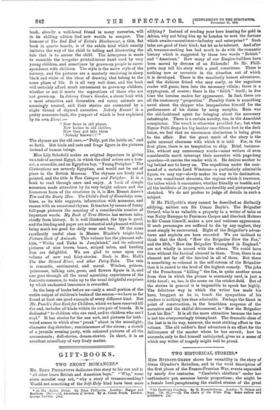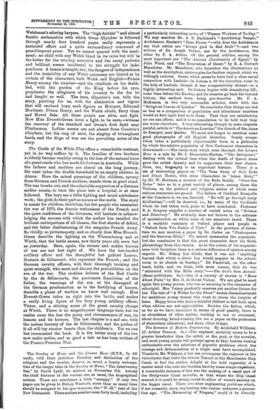TWO HISTORICAL STORIES.* Miss EvEitrrr-GREEN shows her versatility in the
story of Owen Glyndwr's Rebellion, and in the vivid description of the first phase of the Franco-Prussian War, events separated by nearly five centuries. " Cambria's chieftain" under her enthusiastic pen assumes heroic proportions ; she might be a female bard paraphrasing the exalted strains of the great
• (1) Cambria'. Chieftain. By E. Everett-Green. London : T. Nelson and Sons. [Ss. 6c1.1—(2) The Cloo of the White Flag. Same author and publiahero. 1.5s.
Welshman's adoring harpers. The "high-falutin' " and almost frantic acclamation with which Owen Glyndwr is followed through nearly four hundred pages really represents a sustained effort and a quite extraordinary command of grandiloquent prose. Yet we cannot quarrel with the senti- ment; no child with any Welsh blood in its veins but will be the better for the stirring narrative and the many pathetic and brilliant scenes incidental to the struggle for inde- pendence. A lesson is taught, too ; the dangers of independence and the instability of any Welsh autonomy are hinted at by certain of the characters, both Welsh and English—Prince Henry among the number—and the chieftain on his death- bed, with the pardon of the King before his eyes, prophesies the allegiance of his country to the foe he had fought so well. The hero, Glyndwr's son, tells the story, painting for us, with the admiration and vigour that will enchant boys, such figures as Hotspur, Edmund Mortimer, Prince Henry, and the Welsh chiefs, Davy Gam and Howel Sale. All these people are alive, and fight. How Miss Everett-Green loves a fight, to be sure,—witness the recovery of the standard and Owen's first fight near Plinlimmon. Loftier scenes are not absent from Cambria's Chieftain, but the ring of steel, the singing of triumphant bards, and the dirge of woe are the prevailing notes of the story.
The Castle of the White Flag offers a remarkable contrast, yet in no way suffers by it. The families of two brothers suddenly become wealthy owing to the loss of the natural heirs of a great-uncle who has made his fortune in Australia. While the fathers and mothers are absent on the long journey, the aunt takes the double household to an empty chateau in Alsace. Here the mixed parentage of the children, sprung from German and French mothers, stands them in good stead. The war breaks out, and the admirable suggestion of a German soldier cousin, to turn the place into a hospital, is at once followed. The boys see a little fighting and much ambulance work ; the girls do their part as nurses at the castle. The story is meant for children, doubtless, but few people who remember the war of 1870, the frantic enthusiasm of the French and the quiet confidence of the Germans, will hesitate in acknow- ledging the success with which the author has recalled the brilliant anticipations of all classes, the first shocks of defeat, and the bitter disillusioning of the sanguine French Army. So vividly, so picturesquely, and so clearly does Miss Everett. Greendescribe the fighting on the Wissembourg and at Worth, that the battle scenes, now thirty years old, seem but as yesterday. Here, again, the sterner and sadder lessons of war are not lost sight of. We have the hot-headed artillery officer and the thoughtful but gallant Lancer, Gustave de Selincourt, who represent the French ; and the German cavalry officers, with their thorough training and quiet strength, who meet and discuss the probabilities on the eve of the war. The reckless defence of the Red Castle by the de Selincourts, the passionate fanaticism of the father, the warnings of the son at the disregard of the German proclamation as to the fortifying of houses, describe a phase of warfare we know well enough. Miss Everett-Green takes us right into the battle, and makes a really living figure of the fiery young artillery officer, Victor, and a stirring scene of the great cavalry charge at Worth. There is no magniloquent language here, but we realise none the less the pomp and circumstance of war, its lessons and its horrors. The last chapter is a sad one, with the useless bravery of the de Selincourts; and the pathos of it all will try stouter hearts than the children's. Yet we can but recommend the book. It is the better story of the two now under notice, and as good a tale as has been written of the Franco-Prussian War.



























































 Previous page
Previous page